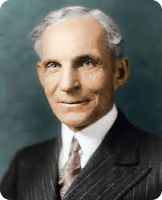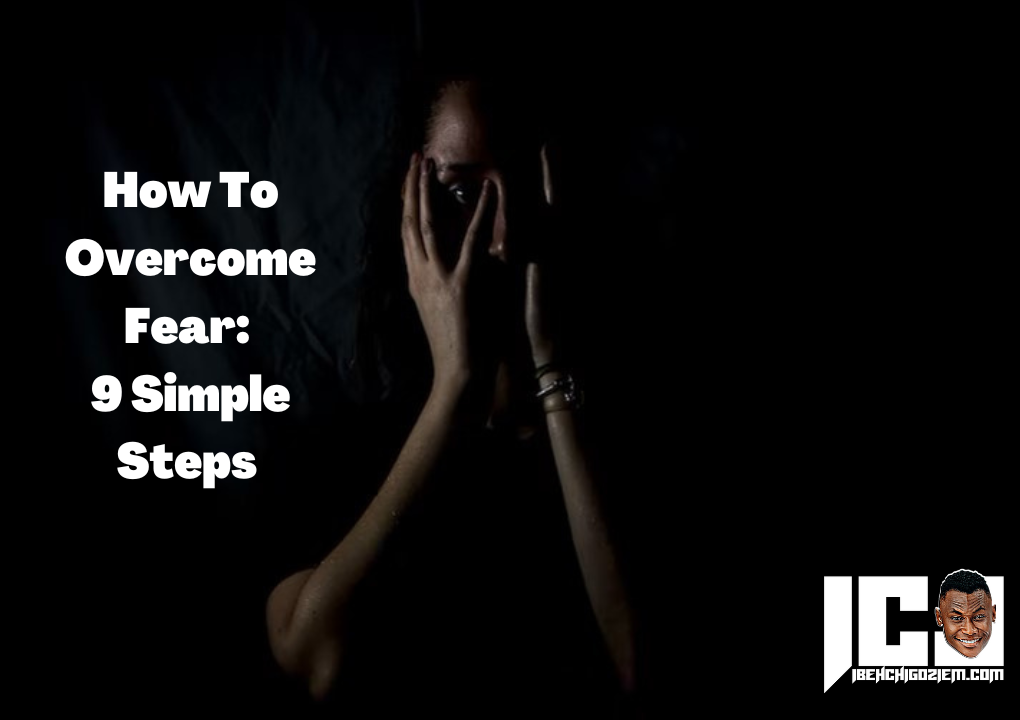How To Overcome Fear
I have had my fair share of fear. And I have learned to overcome it. There’s nothing mystical about fear. It is simply an emotion our minds create in response to actual or hypothetical threats. Whenever it looks like there’s a possibility of things not going how we want, fear comes.
WATCH VIDEO ON HOW TO OVERCOME FEAR
It is even possible that our fears have no basis in reality at all if they are sponsored by hypothetical threats.
So since fear is caused by uncertainties of what might occur to us, it means fear is not the real issue but our mental and psychological response to life and our experiences.
Does this mean fear is not real? Certainly not! If fear weren’t real, we wouldn’t be having this conversation. But the good news is that you are the answer to your fears because you are the source of those fears.
Why Must You Overcome Your Fears?
But is it really important to face our fears and overcome them? Why not just make sure that you live your life in a way that prevents you from having to face your fear?

“The brave man is not he who does not feel afraid, but he who conquers that fear.”
— Nelson Mandela a
I know of a young man who couldn’t even accompany his wife to the airport because he was so terrified of travelling by air.
Another person I knew had shied away from public speaking for more than 20 years until she got to the pinnacle of her career where she had no alternative.
ALSO, READ How To Start Over After A Loss Or Failure
Living in fear puts one at a great disadvantage. If we can understand the advantages of overcoming fear, we can overcome all of these fears as well as many others.
I know it can be difficult if all of a sudden you start to modify the behaviors that have affected your life, thoughts, and actions for a long time. But give yourself a compelling enough reason as a start.
Take a retrospective look at your life and consider all the times fear has stopped you from doing things you want to do. Consider the opportunities you have missed as a result. Bring back to mind how awful it has made you feel, and recall all the anxieties and unrest that have stolen your peace all these years.
If you can see fear as the enemy that it truly is you can follow the guide below and take hold of your life again. Instead of being afraid of new opportunities, you can now be open to developing new interests, travelling more, or finding new employment opportunities. You can anticipate being more content, healthy, and self-assured. Let’s begin the journey.
How To Overcome Fear
there are 9 simple and easy steps highlighted and explained here on how to overcome fear fast and confidently. They are,
1. Acknowledge That Fear Is Real
Pretence is the first step to continue living in fear. But if you must overcome fear, you just acknowledge that you are afraid whenever you get afraid. Fear is real and is being experienced by people right now throughout the world. Fear, like so many other emotions, can signify so many different things to so many different people.

“Decide that you want it more than you are afraid of it”
— Bill Cosby
Here are a few manifestations of fear in a typical society:
- the youngster that needs to be forcibly dragged to school on their first day.
- a man accused of murder stuttering before a judge
- a girl who walks through the corridor filled with guys with her head facing down
So fear is real. It is a strong emotion. Although fear pervades everything, it may still be managed and even used for good.
Secondly, don’t hate yourself for being afraid. I have just explained how everyone in the world experiences fears at one point or the other. So you are not strange for being afraid even if it happens perpetually. Fear is a good place to start as long as you don’t camp there.
2. Identify Your Fears
There have been occasions when I’ve felt scared but didn’t know why. Before you can learn how to overcome fear, you must first identify your fears to avoid confusion in the future.
What is it that frightens you? Make a note of these things rather than just thinking about them. You will be more encouraged to consider the reasons behind your fears when you put them in writing. So don’t just write about the situation you’re afraid of. Write the possibilities you want to avoid. Write what you’re trying to protect yourself from.
E.g I don’t want to speak in front of the class because I am afraid I will make mistakes and people will laugh at me. I am afraid I am not good enough. I am afraid some people don’t like me. I think I am boring. Deep inner work is never comfortable so this exercise isn’t either. But the more you suppress your emotions, the scarier they will be and the more powerless you will feel.

“Nothing in life is to be feared. It is only to be understood”
— Maria Curie
You get the authority to take action to transform your fears after you recognize what the actual fear is and the experience you link with it. Your fears will eventually start to fade, and your power will start to grow.
3. Understand You Are Not In Absolute Control
Many people think that the way they deal with their fears is by becoming control freaks. Regrettably, control has no place in the process of discovering how to conquer fear. In reality, when you are craving control, all you are doing is trying to control everything to cover up your worries. It is time to relinquish control. I’m telling you. That’s how you win.
When we engage in controlling behavior out of fear, it only makes our fears worse because it doesn’t produce the desired effects. You become a victim of fear in your attempt to control it. Many people experience defeat as a result of this cycle of fear and control. There will always be events that are out of your control, that is a fact.
ALSO, READ
Accepting that things aren’t always in our control will be the only way for us to get over our urge to be in charge. While you may be in charge of your choices, you don’t always have control over the circumstances you find yourself in or the reactions of other people.
The only things you can control are what goes on inside of you and how you choose to react to the world around you.
Next time you notice yourself wanting to exert control over everything, take a step back and consider your fears.

” I’m not afraid of storms, for I’m learning how to sail my ship”
— Louisa May Alcott
Get curious and dig into the thoughts that are causing your worry. Fear and curiosity don’t like to live together. You can learn how to get rid of fear by letting go of one and letting the other come in. Real freedom results from complete control loss. When you’re able to do this, you also start the process of letting go of your worries.
4. Use Your Words To Counter Your Thoughts
When attempting to understand how to overcome fear, positive affirmations can be utilized to counteract almost any negative thought patterns. Your brain may be retrained and your worries can be transformed into healthy ones by using positive self-talk to help combat them.
Research has revealed that you can truly educate your subconscious mind to help you attract the specific things you want in life. Look at yourself in the mirror and tell yourself, “I am prepared for this, I am ready, and I will not fail,” as opposed to saying, “I am terrified of doing this because I might fail.”
This is in no way asking you to deny your fears. Remember, the first step is to acknowledge them. But I have also told you that fear is your mind’s response to uncertainties. So affirmations are a way of retraining your mind to handle uncertainty differently.

“Don’t let the fear of striking out hold you back..”
— Babe Ruth
Positive affirmations get stronger the more you utilize them. And creating a positive statement that counters a negative thought is the most effective approach to do so. Decide to incorporate reciting affirmations of success and courage into your morning routine. You may practically change your entire life by starting with just one thought and repeating it repeatedly.
5. Face Your Fears By Doing Something Uncomfortable
I learned this from Tim Ferris. He calls it fear setting— intentionally doing something you are afraid of until you get comfortable doing it.
Doing only things you are comfortable with won’t get you very far in life, and it won’t teach you how to face your fears. In my experience, avoiding your anxieties will only enhance the possibility that they will intensify and ultimately control all of your decisions. I want to challenge you to take on one fear each day. It might be a minor thing. The only thing that counts is that you act. Make it a habit to become accustomed to discomfort.
Dopamine, the chemical in nature that makes you joyful, is released when you put yourself in novel and uncomfortable situations. It is only when you see or experience something wholly novel that a particular section of the brain becomes active.

“One of the greatest discoveries a man makes, one of his great surprises, is to find he can do what he was afraid he couldn’t do.”
— Henry Ford
Fear disappears and confidence increases when you force yourself to do something fearful each day. Remember fear is fuelled by uncertainty. The more uncertain situations you put yourself in, the more you get comfortable around uncertainty.
Your confidence will soar in due time.
6. Ask For Help When You Are Afraid
There’s no rule saying you must handle every situation by yourself. Many times, just having someone go through the difficulty with you will cease your fear. I’m aware that you probably will struggle with this since I know how serious the dread of asking for help is. But this is your fear-setting exercise if you are afraid of asking for help.
We all require people, it’s a fact. We are not created to be insular. So drop the pressure to be independent and embrace the help of people. Confide in a trusted friend, loved one, coworker, or mental health expert. Talk to someone when you are experiencing either mild or severe fear.

“Each of us must confront our own fears, must come face to face with them.” How we handle our fears will determine where we go with the rest of our lives. To experience adventure or to be limited by the fear of it.”
— Judy Blume
It’s not a show of weakness to disclose specific fears to others. Walking up to someone to say “I have this fear, and I want to get rid of it” requires an enormous amount of strength.
7. Maximize Physical Structures To Encourage You
This is an extension of positive self-talk. The mind can be reoriented toward conquering unreasonable fears by using physical cues or pictures.
To assist in reinforcing the constructive thoughts and ideas we’d created, for instance, the woman who was terrified of public speaking did something different. She could handle a conference call with 300 people without a problem so she pretended the microphone was a phone when she spoke in front of 400 people.
The one who always felt “I am not good enough, people won’t like me” placed several posters on the wall of their office.
These posters contained statements like “you got this,” and “you are lovable,” and they received daily reminders and pushes.
What visual cues would you use as a reminder that you can get through this?

“You gain strength, courage and confidence by every experience in which you really stop to look fear in the face. You are able to say to yourself, ‘I have lived through this horror. I can take the next thing that comes along.’ You must do the thing you think you cannot do.”
— Eleanor Roosevelt
8. Cultivate The Attitude of Gratitude
This might seem illogical but gratitude is essential if you want to learn how to conquer your fear. My own experience has taught me that it’s challenging to simultaneously feel anxious and grateful.
They are opposites on the spectrum of human experience. It is simple to give in to dread and overwhelm when going through challenging periods in life. It can be tempting to remain grounded in that intense environment. But having a thankfulness practice enables you to avoid being overwhelmed by dread.
You won’t stop feeling pain, but the blow will be diminished, making it possible for you to appreciate the advantages of struggle. Gratitude is regularly linked to happier lives in several psychology studies.
People who are grateful feel better, remember good times, have better physical and mental health, can deal with problems, and make relationships that last. This also helps clear your mind so you can see a way through the uncertainty causing your fears.

“Fear keeps us focused on the past or worried about the future. If we can acknowledge our fear, we can realize that right now we are okay. Right now, today, we are still alive, and our bodies are working marvelously. Our eyes can still see the beautiful sky. Our ears can still hear the voices of our loved ones..”
— Thich Nhat Hanh
9. Act Against Fear With Your Body
Fear manifests in our behaviors. But the thing is we have grown to tolerate those behaviors and that is one of the reasons why fear can intensify.
When we recognize that fear manifests as a physical response in our bodies, we may confront it using our bodies.
We can use our bodies to assist us to confront our concerns without even knowing where in our brains or what chemicals are rushing through us.
You can examine your speech, posture, and movement if you suffer from a fear of public speaking. Then act out different behaviors from those that manifest while you’re afraid.
For instance, if you notice that whenever you’re afraid you walk with your head down, you can intentionally put your head up even while you feel afraid.
Because your mind has linked having your head down with fear, when it is up, fear begins to fade. It is the same reason why your confidence increases when you smile even when you’re feeling unconfident.

“It is not the critic who counts; not the man who points out how the strong man stumbles, or where the doer of deeds could have done them better. The credit belongs to the man who is actually in the arena, whose face is marred by dust and sweat and blood; who strives valiantly; who errs, who comes up short again and again, because there is no effort without error and shortcoming; but who does actually strive to do the deeds; who knows great enthusiasms, the great devotions; who spends himself in a worthy cause; who at the best knows in the end the triumph of high achievement, and who at the worst, if he fails, at least fails while daring greatly, so that his place shall never be with those cold and timid souls who neither know victory nor defeat.”
— Theodore Roosevelt
Conclusion
Fear is real but it is only real in your mind. Once you can change what’s going on in your mind, you have overcome fear. These eight tips listed above are practical steps you can take to reconfigure your mind’s response to uncertainty.


